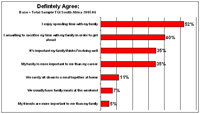It seems that hardly a day goes past without gloomy media speculation that traditional family values are breaking down. But are such interpretations exaggerated? Using the latest research from TGI, we investigate whether strong family ties still exist and how they vary across the world.
Living alone
The rise in single person households in some countries has been held up as the ultimate symbol of family breakdown. Yet, as the latest research from TGI shows, globally it remains far from the norm.
In Asian countries such as Taiwan, Hong Kong, and Indonesia, living alone is highly unusual, with only around 5% of people doing so. A similar situation exists in Latin America. Even in the West, it's still fairly uncommon; South Africa, Germany and Sweden have the highest proportion of single dwellers (around one in five people) but in Spain and the US they account for only 8 and 14% of the population (respectively). In SA, these “singles” are dominated by single parents, who account for 16% of the urban adult population. These single parents tend to be female (80%) and the bulk are black (85%).
Traditional ties
Rising divorce rates and the increasing prevalence of single parent families might indicate disillusionment with the concept of long term commitment. Yet TGI research shows that really we're still pretty traditional; in most of the countries studied, two-thirds or more of the adult population are either married or co-habiting with a partner.
Most people also agree that it's important to have a lasting relationship with one partner, including over 80% of people in Britain and Brazil. In SA, this drops to 76%, with only 57% saying that they definitely agree.
Spending time with the family
TGI research shows that families across the world continue to value their time together. Nearly 90% of French and American people say they enjoy spending time with their families and 84% of Indians say this is their favourite pastime. Sadly only 52% of South Africans definitely agree!
Encouragingly, only 16% of Brits say they rarely sit down for a meal together at home (and there is a similar situation in the rest of Western Europe) although nearly 40% of Russians admit this is the case in their households.
Family expectations
However, it seems that although we love our families, we can feel pressurised by their expectations (a theme particularly evident in parts of Asia, SA and Latin America).
In China, there is often a sense of responsibility to succeed for one's family, and to provide economic support for parents in their old age. So, although the emerging middle class in China are enjoying the benefits of their new found material wealth, their traditional sense of obligation remains – 63% feel it's important their family think they are doing well.
The tendency is repeated in SA with the poorer blacks tending to feel pressured by family expectations. Indeed, over 46% of Socio Economic Level 4, the second lowest, are willing to sacrifice time with their families in order to get ahead.
A universal value
From the research, the importance of the family emerges as a ‘universal' value; that is, a view held to a similar extent in every market. Global brand owners entering local markets can thus safely incorporate these values into their campaigns.
For example, only 5% of South Africans definitely agree that their friends are more important than their family, although sharing family meals is not high on the agenda!






















